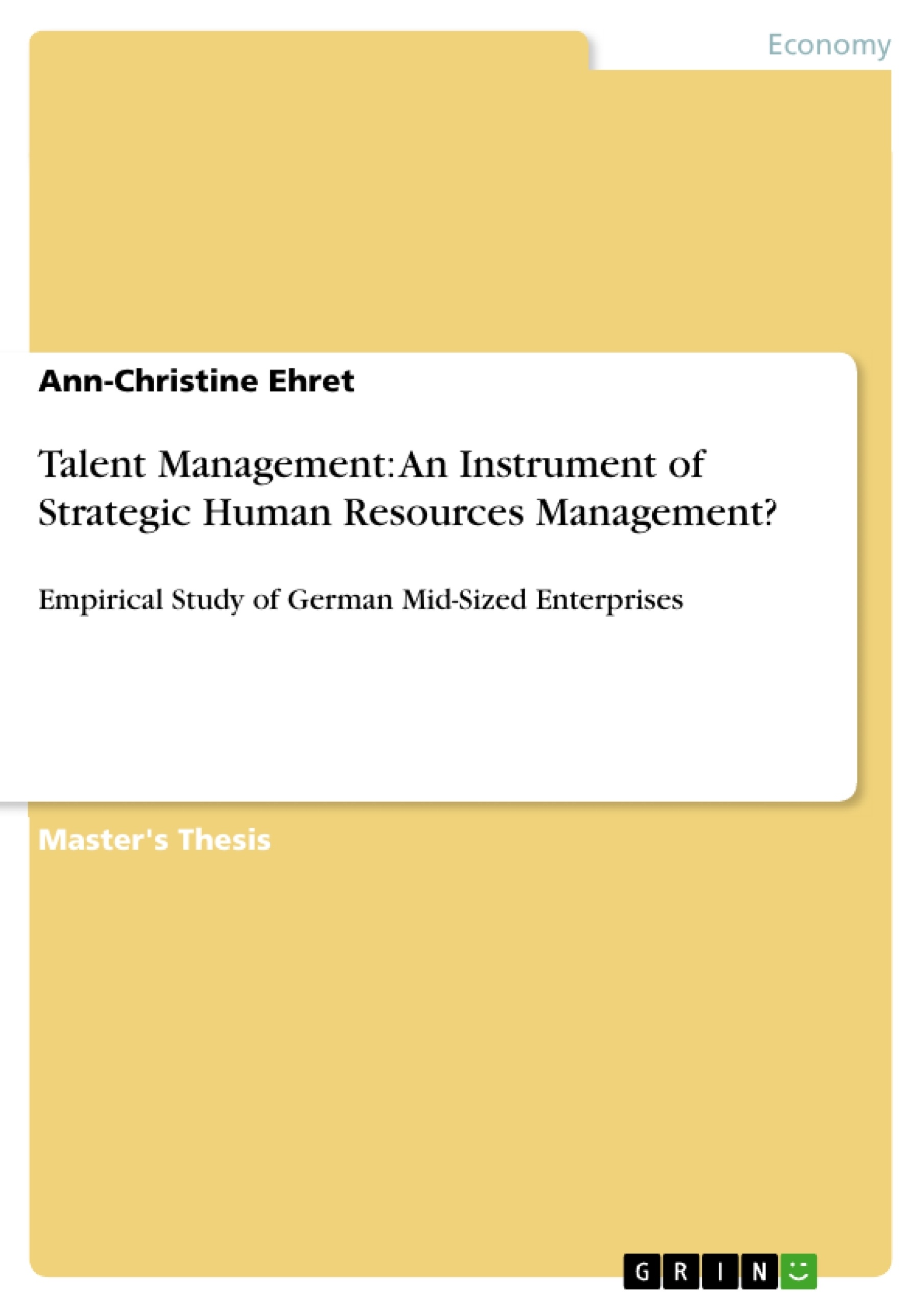This study provides an investigation on Talent Management in German mid-sized enterprises. The purpose of this research is to explore whether Talent Management is an instrument usable to overcome external challenges, such as demographic changes as well as a shortage in skilled labour, to enhance organisational performance and to remain competitive. The research determines that, Talent Management can be seen as a part of strategic Human Resources Management and in this context, as a high performance working system in order to develop, motivate and empower talented employees.
Since empirical data in the national context of Germany are restricted on the one hand and, on the other hand, research efforts regarding Talent Management in small and medium-sized enterprises are of less significance, qualitative research methods were used in order to gather deeper insights. Three in-depth expert interviews were conducted, providing valuable information regarding the conceptualisation and operationalisation of Talent Management in the context of German mid-sized enterprises.
The findings reveal that, what is of strong importance within small and medium sized enterprises in general is the expansion of the term talent to all employees and their skills and abilities instead of seeking for high potentials and so-called A-players. Furthermore, three significant characteristics of German companies; being long-term and developmentally orientated, as well as providing dual vocational training to potential future employees, have been identified. These qualities underlie the highly specialised industries in which German medium sized enterprises operate, skilled labour and development of these is of high importance.
Overall, the dissertation concludes that Talent Management is recognised and implemented as an instrument of strategic human resources management within German medium sized enterprises. Special focus is put on investment in the Human Capital as the development and retention of potential is of strong importance. However, due to limited financial budgets and less recognition of line managers, Talent Management stands in its infancy.
The research recommends further studies in order to investigate the findings and limitations of this dissertation, such as the empirically undetected field of Talent Management as a high performing system in national context or within small-and medium sized enterprises.
Table of Contents
- Chapter 1: Introduction to the dissertation
- 1.0 Introduction
- 1.1 Motivation
- 1.2 Research rationale
- 1.3 Research aim and objectives
- 1.4 Structure of the dissertation
- Chapter 2: Literature Review
- 2.0 Introduction
- 2.1 Talent Management
- 2.1.1 What is a 'talent'?
- 2.1.2 Definition of Talent Management
- 2.1.2.1 Definition of TM for the Purpose of this Dissertation
- 2.1.2.2 Approaches of TM
- 2.1.2.3 TM in Practice
- 2.2 Strategic Human Resources Management
- 2.2.1 SHRM and Organisational Performance
- 2.2.2 HPWS and TM
- 2.3 Medium-Sized Enterprises
- 2.3.1 Definition of MSE in Germany
- 2.3.2 Considerations of the German Business System
- 2.3.3 Impact on SHRM
- 2.4 Gaps in Literature
- Chapter 3: Conceptual Framework
- 3.0 Introduction
- 3.1 The HCT and TM
- 3.2 TM as a HPWS
- 3.3 Summary
Objectives and Key Themes
This study investigates the use of Talent Management in German mid-sized enterprises. The research aims to explore whether Talent Management can be a tool to overcome external challenges like demographic changes and skilled labor shortages, enhancing organizational performance and maintaining competitiveness. The research determines that Talent Management can be considered part of strategic Human Resources Management and, in this context, a high-performance working system to develop, motivate, and empower talented employees.
- Talent Management as a tool for overcoming external challenges in German mid-sized enterprises.
- The role of Talent Management in enhancing organizational performance and competitiveness.
- Talent Management as a component of strategic Human Resources Management.
- Talent Management as a high-performance working system for employee development, motivation, and empowerment.
- The importance of expanding the definition of "talent" to include all employees and their skills and abilities.
Chapter Summaries
Chapter 1 introduces the dissertation, outlining the motivation, research rationale, aim, and objectives of the study. It also presents the structure of the dissertation. Chapter 2 provides a comprehensive review of the relevant literature on Talent Management, Strategic Human Resources Management, and medium-sized enterprises in Germany. It explores various definitions of Talent Management, its practical applications, and its relationship with high-performance work systems. This chapter also analyzes the characteristics and challenges of German mid-sized enterprises in relation to Human Resources Management. Chapter 3 develops a conceptual framework for understanding Talent Management as a high-performance working system and its potential application in German mid-sized enterprises.
Keywords
This study focuses on Talent Management, strategic Human Resources Management, high-performance work systems, and German mid-sized enterprises. The research explores the potential of Talent Management to address challenges like demographic changes and skilled labor shortages, enhance organizational performance, and contribute to a company's competitiveness. The research also examines the characteristics and challenges of German mid-sized enterprises, highlighting their impact on human resources practices.
- Quote paper
- Ann-Christine Ehret (Author), 2014, Talent Management: An Instrument of Strategic Human Resources Management?, Munich, GRIN Verlag, https://www.grin.com/document/310604



